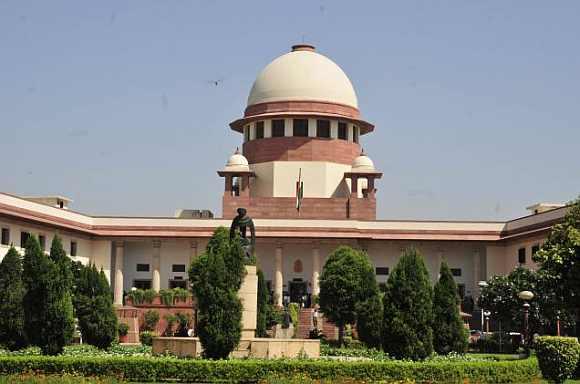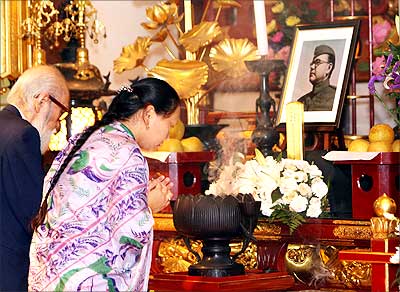'Generations pass by, but those fighting for justice are still not seeing the end to so many cases.'
Bhagvanji Raiyani, chairman of the Forum for Fast Justice, tells Prasanna D Zore/Rediff.com about the Nyay Yatra that will travel from Kashmir to Kanyakumari and from Kutch to Kolkata.

Could you tell us about the purpose of the Nyay Yatra?
We wanted to awaken all the Hindustanis by this 35-day yatra that will travel from Kashmir to Kanyakumari and from Kutch to Kolkata.
This yatra will create awareness among the masses about the delays in closing court cases which drag on for more than 25 years in our country.
The case against those who killed people after Indira Gandhi's assassination (on October 31-November 1-2, 1984) is still being heard in the high court; (it) has yet to reach the Supreme Court. Nobody has been punished for those murders yet.
Thirty-two years have lapsed after the Bhopal gas tragedy (December 3, 1984). The case has been dragging on in the Supreme Court and (is) yet to see any finality.
If this is the status of the cases being fought by the governments and the police, just imagine the status of cases being fought by private individuals!
Generations pass by, but those fighting for justice are still not seeing the end to so many cases.
In 2008 we got the Forum for Fast Justice registered. There are societies under this main trust that is fighting for speedy justice to those affected.
The Nyay Yatra is just a small part of the movement for getting fast justice in India.
Once we have completed this yatra by March 4 at Jantar Mantar in Delhi we will pass a resolution at our national convention that will state 'We expect from the Parliament, government, and judiciary a thorough overhaul of the way justice is dispensed in India and bring in reforms for speedy justice.'
So you have a remedy that can help solve judicial cases speedily?
Not remedies, but we are going to give a ultimatum to the government, Parliament and the judiciary that within eight months of receiving our resolution if a reform process is not initiated in right earnest then we will launch a satyagraha across India to push for these judicial reforms.
What reforms are you demanding?
There are many aspects to these reforms. There is a Supreme Court judgment that lays down how many courts need to be created and how many judges need to be appointed to clear the huge backlog and a provision that calls for an end to never ending adjournments when a case is being heard.
There is also a provision to take action against those who file malicious and intentional affidavits. There are several other things mentioned in this judgment.
Our resolution of March 5-6 will be sent to all the high courts in India and Supreme Court as well as to all MPs.
In this ultimatum we will be giving a time period of eight months and the demands that we will be pushing for will not be the demands of the Forum for Fast Justice, but of the people of Hindustan.
What exactly will you demand in your resolution?
There are provisions under the CrPC (Civil Procedure Code) that there should not be more than three adjournments given to any party when a case is being heard. Judges are bound by this provision. There are also provisions for fining and jailing people who file affidavits as delaying tactics.
Our advocates are framing our demands and once they are in place by March 4 these demands will be circulated among 250 delegates, who will in turn pass a resolution and then serve an ultimatum for enactment of the ultimatum within eight months.
If these are not implemented, then we will begin a nation-wide satyagraha to get these demands implemented.
There are 3.2 crore (32 million) pending cases in the Indian judicial system. Will the acceptance of your ultimatum help clear this backlog?
Have you heard about the case of the All-India Association of Judges?
The All-India Association of Judges went to the Supreme Court in 2001. The final hearing of this case was on March 21, 2002. The All-India Association of Judges went to the Supreme Court with a plea that they were overburdened. There were only 13,000 judges all over India and that turned out an average 10.5 judges for every million Indians.
When the Supreme Court asked them about the situation in the other countries, it was told that that were 41 judges per million in Australia, 51 judges per million in the UK, 76 judges per million in Canada and 107 judges per million in the United States of America and that was the reason the judiciary in these countries was doing fine with dispensation of justice.
If you were to compare the number of judges per million in these countries with those in India, it is obvious these countries you mentioned would have a favourable ratio because of their small populations. If India has had the same population we too would have had a favourable ratio of judges per million...
But that doesn't happen automatically! We have to appoint more judges if our population is bigger. In its judgment in (March 21) 2002 the Supreme Court recommended that in five years we should have 50 judges per million of Indian population.
Despite this today we have not more than 12 judges per million Indians.
There was 30 per cent vacancy to the post of judges even then in 2002 and the same even exists today.
The other part of the judgment was filling up of all vacancies in a period of one year from the date of the judgment. That is the main remedy and we will be launching a satyagaraha to get this judgment implemented in earnestness.
Why do you think these vacancies were not filled or additional judges not appointed as per the 2002 judgment?
The Supreme Court doesn't want to do anything about it. The states and Centre too don't want to act on implementing these recommendations. Even Parliament doesn't want to do anything about it.
When I met the then Chief Justice of India P Sathasivam on March 3, 2014, he told me that the government was not doing anything about it. I told him I have been hearing about this blame game for the last 30 years.
I told him 'You have all the powers to summon the prime minister; you have all the powers to summon all the chief ministers and tell them if your (the Supreme Court) order was not implemented you will prosecute them.'
'Neither Parliament, the government or the judiciary did anything about implementing the judgment. Therefore, the people are the real sufferers.' He had no answer for me.
This is everybody's battle and we will fight it out. It will take long years to bring in those reforms, but we will be tenacious with our efforts and adopt Gandhian principles of non-violence to achieve our goals. We are confident that we will succeed eventually even if it takes time.
Are you going to give this resolution to the prime minister?
President of India too! Prime minister kya hota hai?
I am asking you this because Narendra Modi is a very powerful prime minister and so it is natural to expect more from him...
(Laughs)... I have been observing this for many years that almost one-third of Parliamentarians are facing criminal cases. The other one-third is liable to face criminal cases.
Do you think these people will allow Modi (to better the legal system)?
These people have never spoken about judicial reforms before or after elections. Modi will be helpless among them.











 © 2025
© 2025